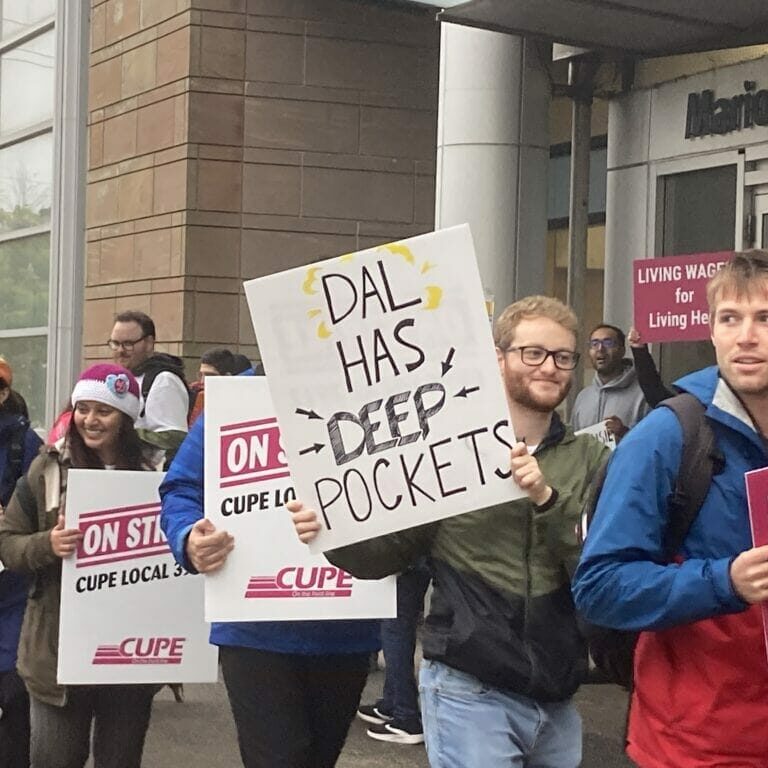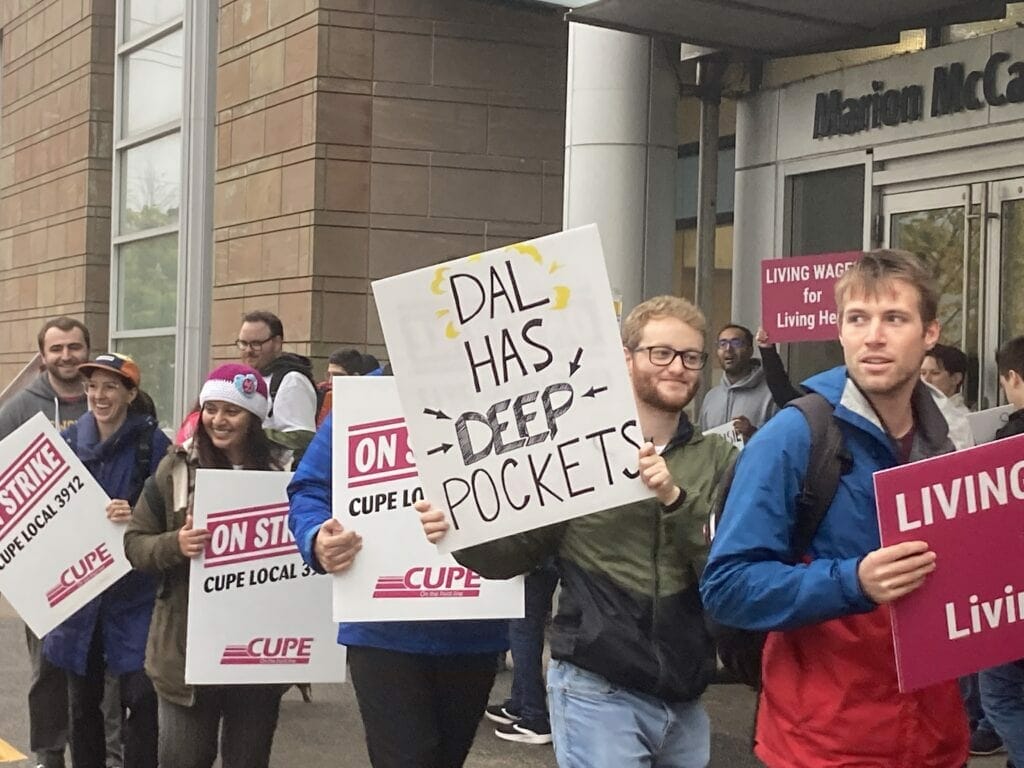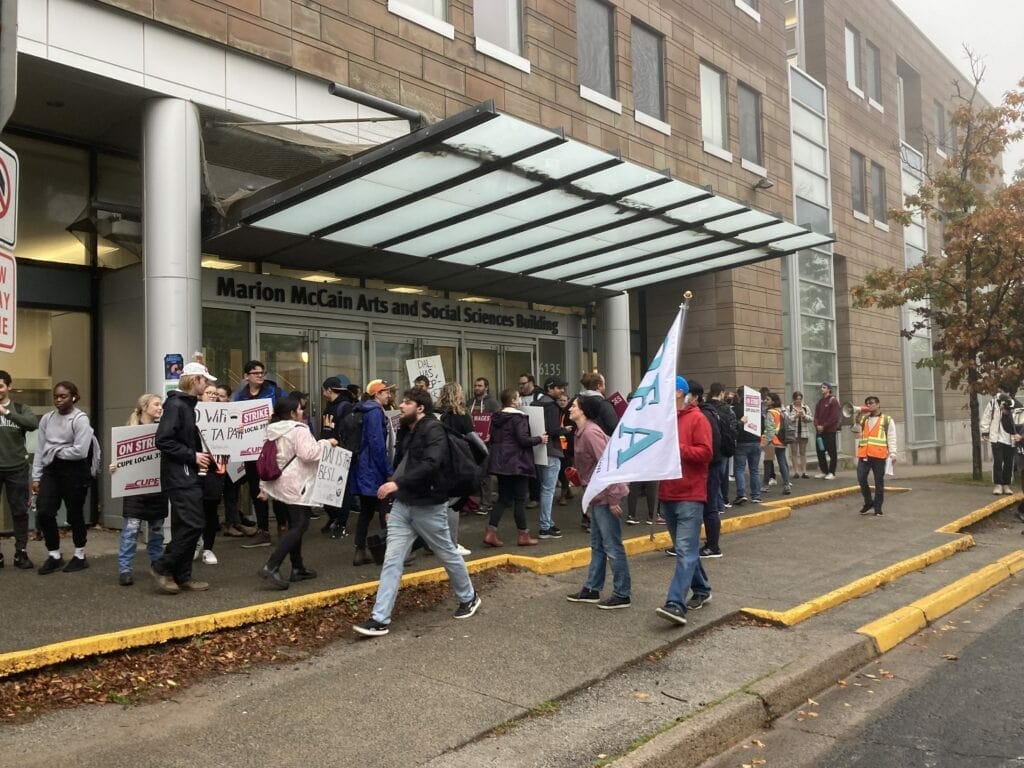
CUPE 3912 Strike at Dalhousie: Everything you need to know
Students left unsure of what to expect as TAs and PTAs begin strike
On Oct. 19, Dalhousie University teaching assistants (TAs) and part-time academics (PTAs) walked out on strike. This came after two years of negotiations with the university’s administration.
Negotiations broke down on Oct. 18 when Dal’s negotiators walked out of last-minute talks. Part-time academics, TAs and supporters started picketing outside the McCain Arts and Social Sciences Building the next morning.
Dal and the Canadian Union of Public Employees Local 3912 (CUPE 3912) failed to come to an agreement on pay increases and other benefits. CUPE 3912 is the union representing TAs, PTAs and staff such as markers and demonstrators. Some lectures, tutorials and marking have halted due to the strike.
“I have goosebumps,” Dreenan Shea, a chemistry TA, said outside the McCain on the first day of the strike. “We’re ready to do what we have to do to get a living wage. Full steam ahead.”
“Authorities are deaf,” said Parem Singh, a TA for computer science courses, who picketed on day one. “You have to raise your voice. If you post [online], they will not do anything. If you strike, they’ll need to do something.”

Reason for Strike
Dal presented CUPE 3912 with its final offer on Oct. 18. The offer, proposed to unfold over a three-year period, presented the following wage increases: a 12 per cent increase for PTA play, 17 per cent for TAs, eight per cent for other hourly paid instructors and a 30 per cent wage increase for markers and demonstrators.
CUPE 3912 asked for wages to increase over a four-year period, with PTA wages increasing by at least 17.5 per cent and TA wages by 27.3 per cent.
CUPE 3912 also requested the elimination of the marker and demonstrator positions and for these roles to be consolidated with TAs. As well, it asked Dal to guarantee that TAs receive letters of employment and contracts at least a week before classes start.
Dal has rejected both offers, saying contracts cannot be offered to TAs before class enrollment is solidified, since their work is dependent on class numbers.
Ellie Weise is a TA for a second-year genetics lab and part of CUPE 3912’s negotiating committee. She was devastated when the sides couldn’t reach a deal.
“I like teaching. I want to teach my lab,” Weise said. “But our members are being exploited. And the only way to stop worker exploitation at this point is through a strike.”
As reported by the Dalhousie Gazette on Sept. 5, both TAs and PTAs at Dalhousie are paid some of the lowest amounts within the U15 Group of Major Canadian Universities. Per course, Dal part-time academics are paid the second-worst rate in the country while TAs are paid the fifth-worst.
“Despite soaring inflation, we have not received even a basic cost of living raise for over three years,” said Gabor Lukacs, CUPE 3912’s communications officer.
A representative from the Dalhousie Registrar’s Office told the Gazette they sympathize with what students are going through and would continue to support them during CUPE 3912 negotiations and the strike.

Impact on students
Dal released a statement to students on Oct. 17 updating students on the strike. The statement clarified most classes at Dal will continue, while only classes taught by CUPE 3912 members will be suspended for the duration of the strike.
Courses not run by CUPE 3912 members but have help from TAs, markers and demonstrators will continue according to the statement. But the university warned of the strike affecting more than just course delivery. Potential impacts include fewer academic supports available for students and longer waits for returned assignments.
The effect of the strike is expected to be felt differently by each student. The direct influence of TAs on courses also varies by year and program.
“One of my classes is totally screwed over,” said Mauraine Bos, a fifth-year student. Bos’s class is heavily reliant on TAs and the strike will be disruptive to its delivery.
On the other hand, second-year student Margo Krass said her class does not know what to expect.
“We don’t really know what’s happening,” Krass said. “Some teachers have reached out but most have not. My physics teacher told us midterms are still going ahead and that we should just expect to get assignments back later.”
With files from Luke Dyment






